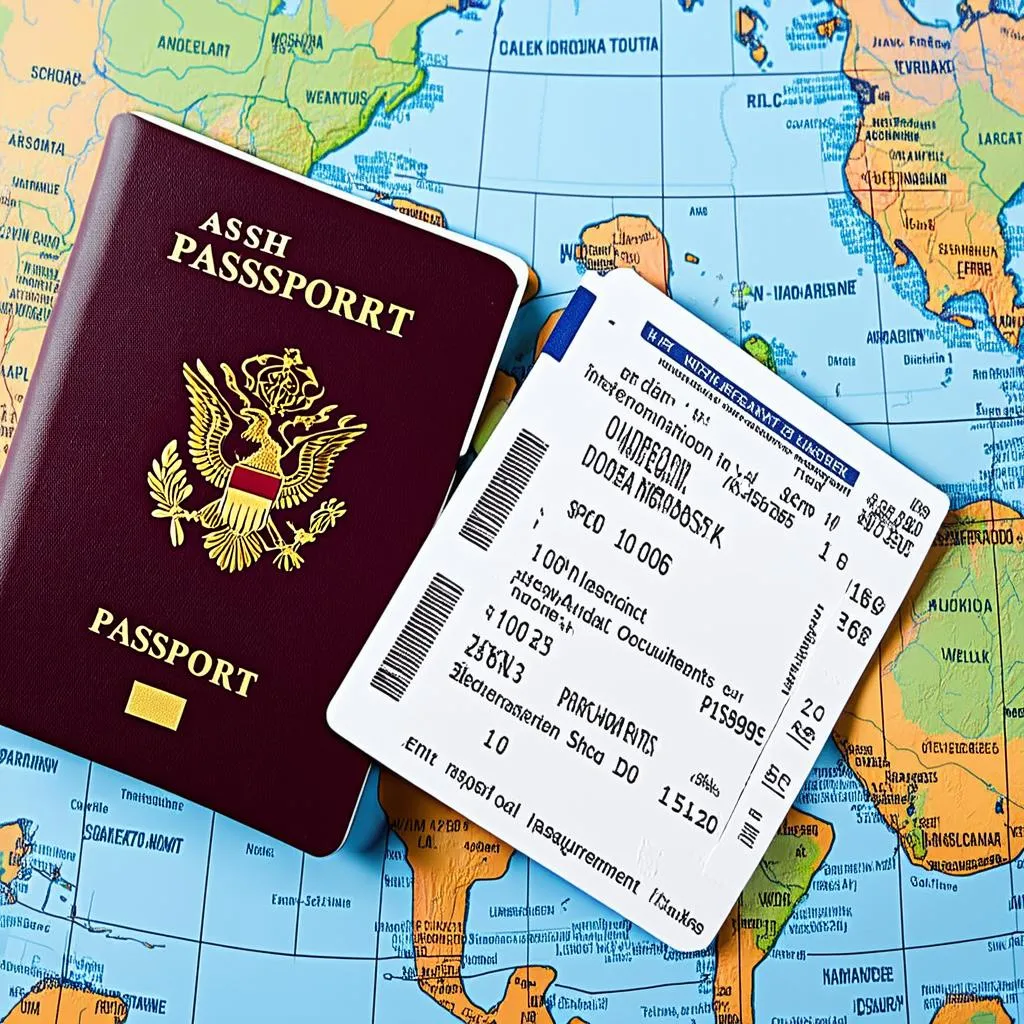Have you ever dreamt of strolling down the Champs-Élysées with a fresh croissant in hand, or perhaps trekking the Great Wall of China? For individuals with a felony on their record, these travel aspirations can often feel out of reach. The question “Can Felons Travel Abroad?” lingers like a heavy fog, obscuring the path to international exploration.
The answer, like many legal matters, is not a simple yes or no. It depends on a complex interplay of factors, including the nature of the offense, the destination country’s laws, and individual circumstances. This comprehensive guide aims to shed light on the often-confusing world of international travel for felons, providing clarity and guidance for those seeking to turn their travel dreams into reality.
Understanding the Barriers: Why International Travel for Felons Can Be Difficult
The ability to travel freely is often taken for granted, but for felons, it’s a privilege that can be revoked. Several factors contribute to these travel restrictions:
1. US Travel Restrictions:
While the US government generally doesn’t bar felons from leaving the country, certain situations might restrict travel, including:
- Probation or Parole: Individuals on probation or parole are typically prohibited from international travel without explicit permission from their parole officer or the court.
- Pending Legal Matters: Felons facing pending charges or ongoing legal proceedings might be barred from traveling abroad.
- Passport Restrictions: In some cases, felons might face difficulties obtaining or renewing a passport, especially for crimes involving drugs or terrorism.
2. Destination Country Restrictions:
Many countries have strict entry requirements for individuals with criminal records. These restrictions often depend on:
- Severity of the Offense: Countries are more likely to deny entry for serious offenses like drug trafficking, violent crimes, or sexual offenses.
- Recency of the Offense: Recent convictions might raise more red flags than older offenses.
- Rehabilitation Efforts: Demonstrating rehabilitation through employment, community involvement, or other positive actions could improve your chances of entry.
3. Visa Requirements:
Even if a country doesn’t explicitly ban felons, you might encounter difficulties obtaining a visa. Many countries require visa applicants to disclose criminal histories, and a felony conviction could lead to a visa denial.
Planning Your Trip: Steps Felons Can Take to Increase Their Chances of Traveling Abroad
Despite the challenges, traveling abroad as a felon is not impossible. Careful planning and proactive steps can significantly increase your chances of experiencing the world:
1. Consult with an Experienced Attorney:
Seeking legal counsel from an attorney specializing in international travel for felons is crucial. They can provide personalized advice based on your individual circumstances, the specific laws of your desired destination, and potential legal hurdles. For instance, an attorney can guide you through the process of obtaining a Certificate of Rehabilitation or pardon, which can demonstrate your rehabilitation to foreign governments.
Expert Insight: “Many felons mistakenly believe that their past prevents them from ever traveling abroad. However, with proper legal guidance and thorough planning, many individuals can overcome these obstacles and fulfill their travel aspirations.” – Sarah Williams, Immigration Attorney at Law
2. Research Your Destination Thoroughly:
Each country has its own unique laws and regulations regarding entry with a criminal record. Consult the embassy website of your intended destination or contact them directly to inquire about their specific requirements for travelers with felony convictions.
3. Apply for a Passport Early:
Apply for or renew your passport well in advance of your planned travel dates. Be prepared to provide detailed information about your felony conviction, including court documents and rehabilitation efforts.
4. Gather Supporting Documents:
Compile a comprehensive file of documents that demonstrate your rehabilitation and low risk to the destination country. This may include:
- Court Documents: Provide copies of your sentencing documents, parole or probation orders (if applicable), and any certificates of rehabilitation or pardons.
- Employment Verification: Include letters of employment verifying your current job and good standing.
- Character References: Gather positive character references from reputable individuals who can attest to your rehabilitation and character.
- Travel Itinerary: Provide a detailed travel itinerary, including accommodation bookings, flight confirmations, and planned activities.
5. Be Honest and Transparent:
Attempting to conceal your criminal history is never advisable and could lead to more severe consequences. Be upfront and honest about your past when applying for visas or entering a foreign country.
Navigating Specific Destinations: Examples and Considerations
Let’s explore some popular travel destinations and their stance on entry with a felony conviction:
1. Canada:
Canada is known for its strict entry requirements for travelers with criminal records, including DUIs. However, felons can apply for a Temporary Resident Permit or Criminal Rehabilitation to overcome this obstacle.
2. Mexico:
Mexico generally allows entry for travelers with minor offenses, but serious felonies could lead to denial. It’s crucial to consult with the Mexican Embassy or Consulate for specific guidance.
3. European Union:
Each country within the EU has its own regulations, but generally, serious or recent convictions might lead to entry bans.
4. Caribbean Islands:
Many Caribbean islands are popular tourist destinations, and their entry requirements for felons can vary. It’s crucial to research the specific island nation you plan to visit.
5. Asia:
Asian countries like Thailand and Vietnam often have more lenient entry policies for travelers with minor offenses. However, drug-related convictions are treated seriously in many Asian nations.
Travelcar.edu.vn: Your Guide to Navigating the World with Confidence
Planning a trip abroad can feel overwhelming, especially with a felony conviction. TRAVELCAR.edu.vn is here to provide you with the resources and information you need to navigate the complexities of international travel. We offer articles and guides on various destinations, visa requirements, and tips for traveling with a criminal record.
Explore these relevant articles:
- Can a Felon Travel Out of the Country?
- Can Felons Travel Outside the United States?
- Are Felons Allowed to Travel Outside the Country?
 Planning Your Trip
Planning Your Trip
Frequently Asked Questions:
1. Can I travel to any country with a felony?
There’s no universal answer. Some countries are more lenient than others, and the type of felony, its recency, and your rehabilitation efforts all play a role.
2. Will I need a lawyer to travel abroad with a felony?
While not mandatory, consulting an attorney specializing in international travel for felons is highly recommended. They can provide personalized guidance and help you navigate the legal complexities.
3. What if I’m denied entry to a country?
Being denied entry can be a frustrating experience. It’s important to remain calm, cooperate with authorities, and seek legal counsel if necessary.
 Ready for Takeoff
Ready for Takeoff
Embrace the Journey: Travel with Knowledge and Confidence
Traveling abroad with a felony conviction requires careful planning, thorough research, and a proactive approach. By understanding the potential barriers, seeking expert advice, and meticulously preparing your application, you can increase your chances of experiencing the world and creating unforgettable memories. Remember, your past doesn’t have to define your future, and the world is full of opportunities for exploration and growth.
Do you have any questions about traveling abroad with a criminal record? Share your thoughts and experiences in the comments below!
